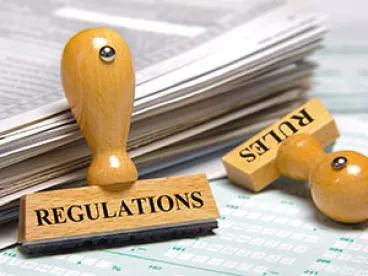While President Trump’s border security policy has dominated recent news headlines, his deregulation policy has quietly jockeyed into a better position to survive court scrutiny. Last week, a federal district court issued an opinion that suggests it may never confirm whether the Trump Administration’s “two-for-one” executive order thwarts consumer protection and safety-related rulemakings by past administrations, because no plaintiffs have standing to raise these arguments. Rulemakings have a primary role in environmental law. This decision emphasizes that, in many cases, rulemakings will continue to be primarily shaped by the executive branch, not courts, excepting in particular cases.
Within two weeks of taking office, President Trump signed Executive Order 13771, which mandated that each executive branch agency: (1) repeal two rules for every new one it issued; (2) offset the private cost of compliance with any new regulation; and (3) cap the overall private cost of compliance with all regulations at a specific amount each year. Two NGOs and a labor union immediately sued to block the order from taking effect, and their lawsuit, Public Citizen, Inc. et al. v. Donald J. Trump et al., is pending in federal district court in Washington, D.C. We blogged previously about the issue of the NGOs’ and union’s “standing” to sue, which is a threshold amount of injury the court requires before taking up the plaintiffs’ claims.
In the opinion, the court denied the plaintiffs’ motion for partial summary judgment on the issue of their standing. At the same time, the court denied the government’s motion to dismiss the case — for lack of standing. The rulings may seem contradictory, but the court’s reasoning shows what types of harm a plaintiff will need to allege in order to challenge how an administrative agency decides whether to promulgate a new rule. When the court denied the plaintiffs’ motion, it focused on two particular types of shortcomings with the plaintiffs’ allegations.
Slow Rulemaking Does Not Equal No Rulemaking
The plaintiffs pointed to five different sets of proposed rules, which they claim have stalled and thus have eroded consumer protection or public safety. Specifically, they claim that subdivisions of the federal Departments of Energy, Labor, and Transportation have each either delayed or backtracked on rules that they were supporting prior to the executive order. A key takeaway from the court’s opinion is that slow rulemaking is not enough of an injury to qualify for standing.
Generally, in administrative law, courts wait until an executive branch agency issues a final rule before they decide whether that rule has caused actual harm. That is also at play here, with the plaintiffs alleging that the lack of rule has caused harm. If the evidence does not show that the agency has conclusively scuttled a proposed rule, a court may find the dispute is not yet ripe to decide.
For example, the court rejected the plaintiffs’ arguments that their members had been injured because of delays enacting workplace violence protections or updated energy efficiency standards. The court found the plaintiffs had shown no delay where the Occupational Health and Safety Administration had taken steps such as initiating a review of a proposed workplace violence rule’s language for compatibility with another statute. Similarly, it found no delay where the Department of Energy opened a new public comment period on a proposed rule about appliance efficiency standards, even where the Department of Energy had missed a statutory deadline to finalize the proposed rule.
Government-Caused or Untraceable Harm?
The court accepted the plaintiffs’ arguments that in two instances agencies had abandoned proposed rules. Moreover, the court found it plausible that in these instances, the lack of a rule had harmed individual members of the plaintiff organizations. However, the plaintiffs could not show that the executive order had caused the various government agencies to abandon particular proposed rules. For that reason, the court found that the plaintiffs had failed to show standing.
For example, the court found that the National Highway Traffic Safety Administration (NHTSA) had shelved an auto industry-wide standard for vehicle-to-vehicle communications. The court accepted the plaintiffs’ argument that the lack of a federally coordinated standard effectively deprived their safety-conscious members of a desirable product — new cars in the next five years that included this crash-reducing technology. However, the court found that the plaintiffs had failed to show that NHTSA acted out of the ordinary when it stopped actively advancing the standards.
Similarly, the court accepted the plaintiffs’ claim that the lack of a Department of Transportation (DOT) rule requiring airline ticket websites to post baggage fees at the point of sale had injured the plaintiffs’ members who had to pay fees for what they believed was included in their ticket prices. However, the court found that the plaintiffs had not shown that DOT had formally withdrawn its proposed rule about baggage fee disclosure because of the executive order.
As the last two examples suggest, to have standing, plaintiffs must show how the executive order interrupted the normal, deliberative processes that government agencies follow when they engage in rulemaking. It may be impossible for these plaintiffs to produce evidence of such an interruption. Despite any popular beliefs to the contrary, courts cannot necessarily react to any allegedly inappropriate action by the executive branch. The Public Citizen decision emphasizes that courts will only weigh challenges to the Trump Administration’s deregulatory agenda where plaintiffs can demonstrate that they have individualized, particularized injuries to final agency actions.




 />i
/>i

